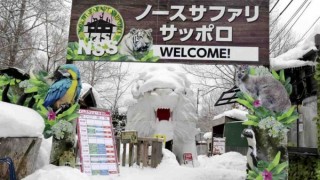Loading
Search
▼ ‘Japan’s Most Dangerous Zoo’ in Sapporo to Receive Closure Order
- Category:Other
The zoo is popular because visitors can directly interact with animals. It is often introduced in TV shows and travel magazines as the “most dangerous zoo in Japan” for allowing visitors to enter a cage and feed the tigers.
The Sapporo municipal government plans to order a company operating a zoo to remove buildings, which were constructed without permission, in an area where the development of residential and commercial buildings is restricted.
Issued under the City Planning Law, the building disposition order covers all North Safari Sapporo buildings in Sapporo, including animal-rearing facilities and offices. According to the city, it will be the first order of this kind for a zoo in Japan and a de facto closure order for the zoo.
The zoo is located in a mountainous area about 20 kilometers southwest of central Sapporo and was opened in July 2005. It has accommodation facilities and keeps and exhibits about 150 animal species, including lions, tigers and Asian black bears.
The zoo is popular because visitors can directly interact with animals. It is often introduced in TV shows and travel magazines as the “most dangerous zoo in Japan” for allowing visitors to enter a cage and feed the tigers.
A building disposition order is meant to allow authorities concerned to forcibly remove buildings not conforming to municipal urban development plans. If the party does not follow a finalized order, they will be subject to up to a year of imprisonment or a fine of up to ¥500,000.
According to the municipal government, since the entire premises of the zoo are within an urbanization control area, advance permission is required to construct buildings such as animal-rearing facilities.
In October 2004, before the zoo opened, the city confirmed construction of the zoo had begun without permission. The city gave an administrative direction to the zoo operator, Success-Kanko Corp., to obtain the necessary permission.
However, the company continued construction without following the direction and opened the zoo. It continued to expand the zoo, reaching up to about 150 buildings. The city has given many written and oral directions to the company.
While the company responded to the government, saying, “We will improve the situation,” it did not follow directions from the city. In order to obtain permission for development, it is necessary to submit development plans and designs that meet requirements.
“Since obtaining permission requires a lot of labor and cost, the company might not have had any intention to do that from the beginning,” a senior municipal government official said.
500 Complaints
Many social media posts have criticized the zoo since November for its arrangements, such as overnight stays in a room with an observation window into a seal enclosure, which might cause the animals excessive stress. The municipal government has received more than 500 complaints.
An online campaign for collecting signatures is underway to call for the zoo’s suspension of business and ask the Environment Ministry to take action to address the situation.
The city apparently decided to take strict measures not only because the company has ignored administrative directions for many years, but also because it took strong public sentiment against the zoo into account.
According to a senior government official, the city will notify the company when it is ready to issue the building disposition order and then hold a “hearing” procedure to listen to the company’s claims before making a final decision.
When the company opened the zoo, it did not register to relevant authorities of its license as a Type 1 Animal Handling Business, which is necessary to operate a zoo. When the city became aware of the situation just after the zoo opened, it gave the company an administrative direction to take necessary measures.
However, after the government received the registration in May 2006, it repeatedly allowed the company to renew the license. When a food court and accommodation facilities were built within the zoo, the city gave the company business licenses based on the Food Sanitation Law and the Hotel Business Law.
The city retroactively accepted the registration of the license from the company even though the city knew that the company was possibly violating City Planning Law.
“Since animals were already being kept and exhibited at the zoo, the city needed to take measures to protect them,” a city official said.
The city has renewed the company’s license registration and permitted it to operate hotels and other businesses. Regarding this, the city said these businesses fall under different laws from the City Planning Law, so it was unable to refuse renewal or permission applications from the company unless it violated relevant laws or regulations.
“We cannot make any comments,” an official at the company said to The Yomiuri Shimbun.
- February 10, 2025
- Comment (0)
- Trackback(0)


